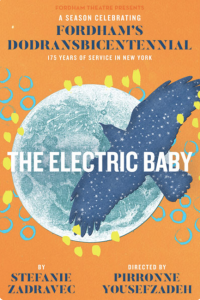By Alexandra Mandalakis
Magic, heroism and love intertwined beautifully in playwright Stefanie Zadravec’s “The Electric Baby,” Fordham University Lincoln Center’s latest drama performance. Directed by Pirronne Yousefzadeh, this heartfelt piece follows the lives of a Pittsburgh couple, a forgotten teenager and a magical family in a fantastic journey that weaves all of these different souls into one piece.
Upon walking in, audience members were immediately pulled into the story. A mystical mother Natalia (Tora Alexander, FCLC ’17) knits on a rocking chair, beside a crib completely entangled with thick colored rope that climbed all the way up to the ceiling to create a sort of tree of life effect. This nursery scene took place on an elevated circular center stage, with a semi-circle back wall covered in various apartment windows, an innovative and captivating scenic design by Reid Thompson. As I was soon to discover, the set would only become become more wondrous with the help of Cesca Wolos-Fontento’s, FCLC ’17, lighting design containing well balanced isolation on scattered scenes throughout the production, as well as rhythmic room lighting through the scattered windows.
The story began with a comedic monologue from Natalia in which she humorously reminded us to silence our cellphones, introducing the character’s spunky and fun personality to the audience right off the bat. Natalia only hinted at what the audience assumed to be some sort of magic child, and we were left with unanswered questions by the end of this introduction.
The audience was then thrown into an argument between married couple Reed, (Peter McNally, FCLC ’17) and Helen, (Alicia Moeller, FCLC ’18) walking down the street. One could just feel the couple’s tension and the repressed issues brewing between them. The focus changed to a yellow taxi where teenage friends Rozie (Rachel Ravel, FCLC ’19) and Dan (Tony Macht, FCLC ’17) chatted while Bimbo (Wayne Mackins, FCLC ’19), a Nigerian taxi driver, listened intently. The scene concluded with Helen storming away from Reed, which caused the taxi to crash, tragically killing Dan.
The rest of the storyline followed these characters as they interacted with each other and came to terms with the fact that sometimes heroes can be found in the least expected places. Rozie helped Bimbo recover in the hospital and temporarily had relations with Reed as a part-time prostitute, all the while continuously being haunted by Dan. Reed and Helen struggle with their marriage, and a dark past of a lost child reaches the surface. Natalia and Bimbo tell fables to their child and slowly reveal the story of how they found each other and fell in love.
Every scene occurs outside of the center circle, where Natalia cares for her baby that “glows like the moon” until he eventually leaves the world at the end of the play. We are left to reflect on the unimaginable tragedies the characters faced and the courage required to simply live through it all. Yousefzadeh’s directorial note found in the program for “The Electric Baby” touches upon this heroism. “Despite all that [the characters] encounter, they are heroic in summoning their strength and working at the top of their abilities to overcome seemingly insurmountable obstacles,” said Yousefzadeh.
This compelling story came to life with a successful production team and a well-selected cast. Alexander portrayed Natalia exquisitely, with just the right balance of spunk and maturity for a struggling yet powerful middle-aged mother. McNally and Moeller as Reed and Helen Casey respectively worked extremely well together as they both conquer the exact emotional battles of a couple in distress. Mackins held a strong, yet occasionally humorous Bimbo, while Macht kept the audience laughing throughout the night with his comedic timing. However, Ravel as Rozie slightly missed the mark in grasping the distress of such a damaged and emotionally broken young woman.
Overall, “The Electric Baby” was a powerful start to Fordham Lincoln Center’s Main Stage Dodransbicentennial Season. The comedic elements kept the story moving, the magic kept the story alive and the entwinement of these factors through love created true electricity.

Lincoln Center opened its dodransbicentennial season with “The Electric Baby.” (Courtesy of Fordham Theatre).
